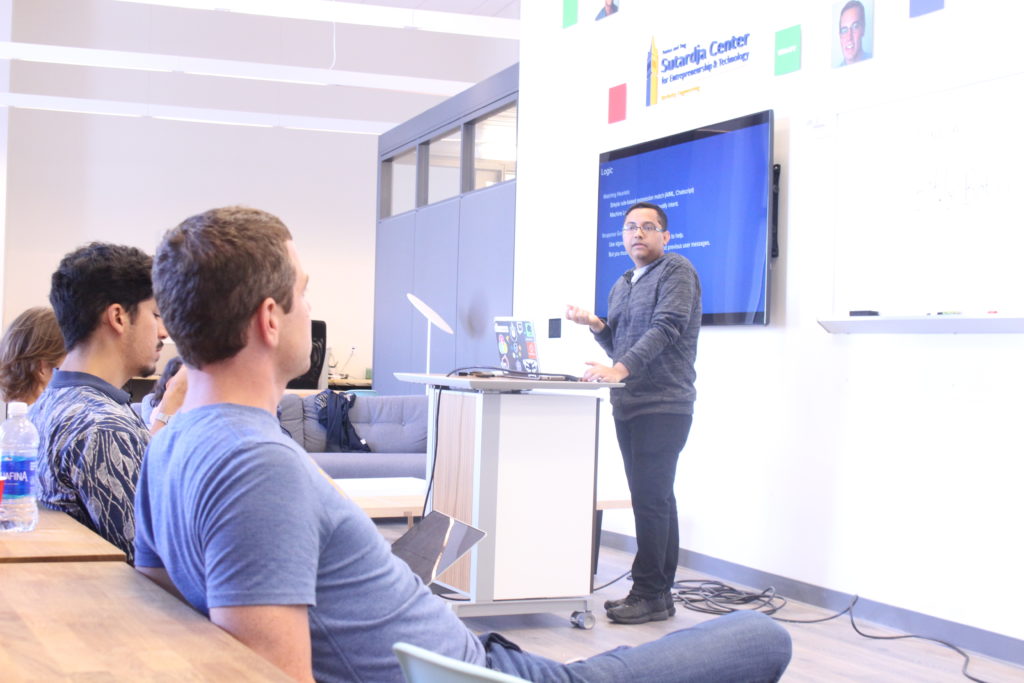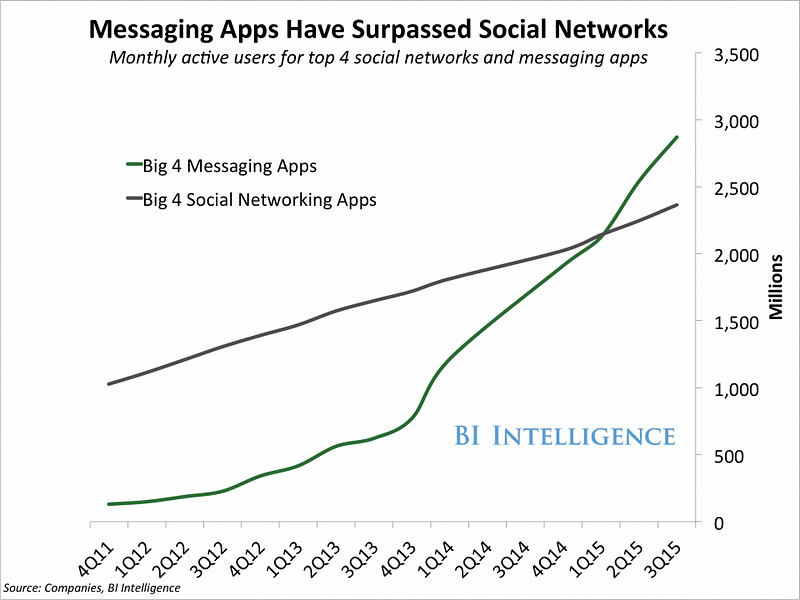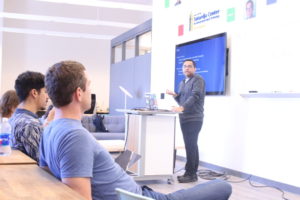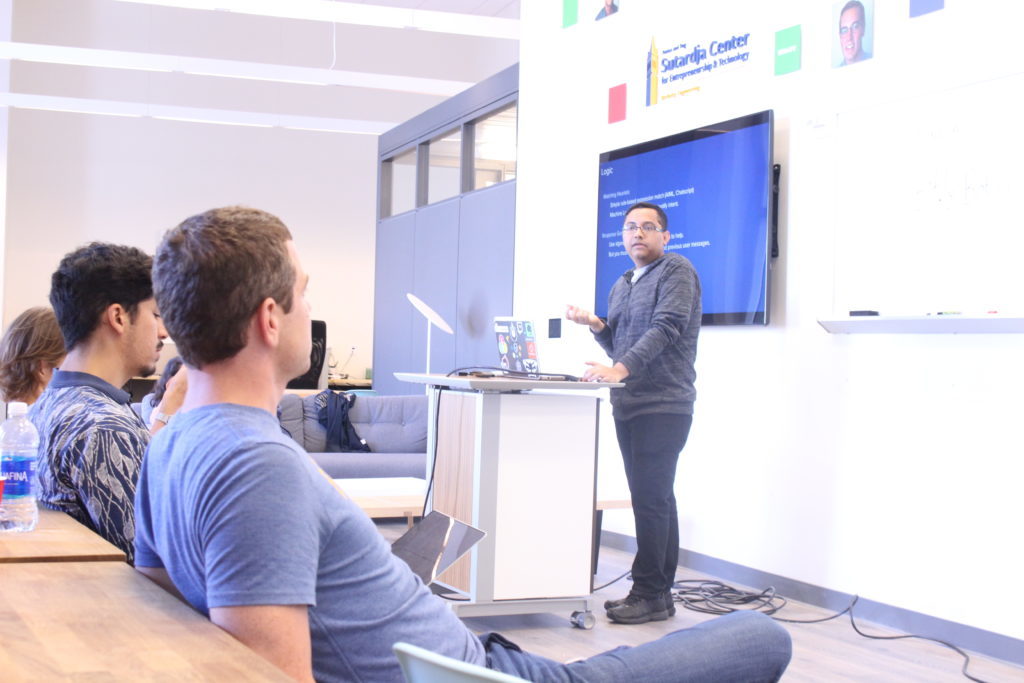AI Chatbot Collider Challenges Students To Push The Boundaries Of Human Computer Interaction

Last week the Sutardja Center kicked off the AI Collider challenge for Berkeley students interested in working on the latest trend in human computer interaction — conversational interfaces or as they are popularly known, chatbots. Students participating in the collider competition will identify issues that prevent existing chatbots from being engaging and work on creating a chatbot that will keep a person engaged over a period of time. Steve Chen, Director of Engineering for Cheetah Mobile, challenged students to build a chatbot that could pass off as a human commenter on one of their news apps.
A chatbot is a software service that people interact with via chat. The service can be presented to people through popular messaging platforms like Facebook Messenger, Slack, Telegram, Kik, etc. Chatbots offer different experiences based on the purpose with which they were created. A business will likely want to create a chatbot that helps people purchase something. On the other hand, they might want to create a chatbot that can answer customer support questions.
Why is this interesting, you ask? Chatbots are opportunities for distributing services through popular messaging platforms. The fundamental idea is that customers will interact with the bot through conversation and be delighted by the experience without the complexities of installing an app. For the first time ever, people are spending more time in messaging apps than in social media. If this trend continues, chatbots in messaging apps will be how businesses can reach people.

People are spending more time messaging than ever [image credit: chatbotsmagazine.com]
This Collider challenge will include 4 specially selected teams of 3 students who will be asked to develop code to create a chatbot that can talk with people and keep them engaged long enough to allow for additional recommendations on content. Depending on what a person will share in the conversation, the chatbot can potentially offer news stories, suggested movies, products, etc. The goal is to make the conversation engaging and helpful enough so that multiple recommendations can be offered and followed.
The lead technical advisor for the collider will be Nikhil Mane, a graduate of the School of Information, UC Berkeley. Nikhil is an alumni of the Sutardja Center and has been actively involved with the chatbot trend since it first became popular. He will select students to form teams and provide technical and product guidance to them during the challenge. Students will also be advised by Prof. Roberto Zicari, Founder, Frankfurt Big Data Lab and Robert Moore, Research Staff Member, IBM Research as well as industry leaders from Slack and Facebook.
Berkeley students in this Collider, will work to understand the current issues with chatbots and figure out ways to solve them. They will focus on creating and facilitating interesting conversations that will keep people coming back for more. Ultimately, that will lead to significant design and development in the field of human computer interaction.

Last week the Sutardja Center kicked off the AI Collider challenge for Berkeley students interested in working on the latest trend in human computer interaction — conversational interfaces or as they are popularly known, chatbots. Students participating in the collider competition will identify issues that prevent existing chatbots from being engaging and work on creating a chatbot that will keep a person engaged over a period of time. Steve Chen, Director of Engineering for Cheetah Mobile, challenged students to build a chatbot that could pass off as a human commenter on one of their news apps.
A chatbot is a software service that people interact with via chat. The service can be presented to people through popular messaging platforms like Facebook Messenger, Slack, Telegram, Kik, etc. Chatbots offer different experiences based on the purpose with which they were created. A business will likely want to create a chatbot that helps people purchase something. On the other hand, they might want to create a chatbot that can answer customer support questions.
Why is this interesting, you ask? Chatbots are opportunities for distributing services through popular messaging platforms. The fundamental idea is that customers will interact with the bot through conversation and be delighted by the experience without the complexities of installing an app. For the first time ever, people are spending more time in messaging apps than in social media. If this trend continues, chatbots in messaging apps will be how businesses can reach people.

People are spending more time messaging than ever [image credit: chatbotsmagazine.com]
This Collider challenge will include 4 specially selected teams of 3 students who will be asked to develop code to create a chatbot that can talk with people and keep them engaged long enough to allow for additional recommendations on content. Depending on what a person will share in the conversation, the chatbot can potentially offer news stories, suggested movies, products, etc. The goal is to make the conversation engaging and helpful enough so that multiple recommendations can be offered and followed.
The lead technical advisor for the collider will be Nikhil Mane, a graduate of the School of Information, UC Berkeley. Nikhil is an alumni of the Sutardja Center and has been actively involved with the chatbot trend since it first became popular. He will select students to form teams and provide technical and product guidance to them during the challenge. Students will also be advised by Prof. Roberto Zicari, Founder, Frankfurt Big Data Lab and Robert Moore, Research Staff Member, IBM Research as well as industry leaders from Slack and Facebook.
Berkeley students in this Collider, will work to understand the current issues with chatbots and figure out ways to solve them. They will focus on creating and facilitating interesting conversations that will keep people coming back for more. Ultimately, that will lead to significant design and development in the field of human computer interaction.


